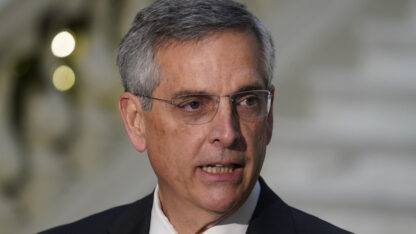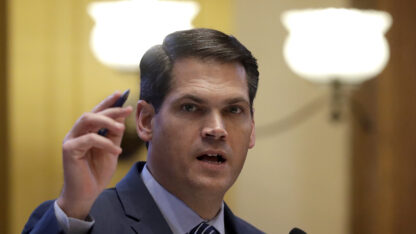Cobb Residents Push For Park Funding Before Braves Stadium

A group of Cobb County residents are asking commissioners to honor a referendum passed by Cobb voters in 2008.
It was a $40 million bond referendum dedicated to purchasing land to build public parks, but the recession put the bond issue on hold.
The 2008 park bond was never funded, but some residents say they’re concerned money meant for parks will be allocated to the new Braves Stadium.
Braves Stadium
Park advocates like Jennifer Burke with the Cobb Parks Coalition said the money from the 2008 park bond that voters approved should be funded and set aside before it might be redirected to any other projects like the new Braves stadium.
Cobb County Commission Chair Tim Lee explained the decision to shift money from one fund to another was made years ago.
“The board of commissioners back in 2013 agreed to the funding mechanisms associated with the SunTrust Park,” Lee said. “It was also me, Tim Lee, who introduced the agenda item and led the initiative to reconsider the issuance of these greenspace bonds.”
Lee said Cobb County Commissioners approved the transfer of debt service funds, which are funded by property taxes, to the county’s general fund in 2017 after its debt service fund expires. A portion of the debt service fund was approved to pay for the new Braves stadium at SunTrust Park in November 2013. About $9 million is expected to be raised from the shift to the general fund to finance SunTrust Park construction.
“Our decision to move forward with the SunTrust Park partnership was never a choice between the Atlanta Braves and Cobb County parks,” Lee wrote in his January newsletter. “The only objective was to make sure that we maximized all available resources to ensure a smart investment that would result in the best outcome for Cobb County now, and far into the future.”
How Much Money Is Left?
The Cobb Parks Coalition said they are grateful for the new effort to fund the $40 million bond and add public parks, but another point of contention is how much money remains.
Because the 2008 park bond was not funded after voters approved it, Cobb County attorney Deborah Dance said the $40 million park bond can’t be extended for the seven-year delay.
“The referendum that was passed by voters stated specifically that the $40 million was to be paid in predefined increments, as outlined in the actual referendum, over a period of 14 years,” Lee said. “As each year goes by, those increments expire. Therefore, the full $40 million is no longer available.”
But Burke said since the Cobb County Board of Commissioners chose not to fund the 2008 Park Bond, it changed the terms and conditions.
“There was a timeline set for the park bond to be repaid in 15 years. But in 2009, the Board of Commissioners decided not to start paying the park bond,” Burke said. “When they did that, we would argue, the funding must be reset, because referendums are binding.”
She said the county can easily refinance the bond for the full $40 million at a lower rate and is “obligated to fully fund voter-approved referendums as intended.”
“Other court cases around the country support the democratic right of direct referendum funding, and certainly before moving earmarked money for any other project,” Burke said.
Remaining Land
In late January, Cobb County Commission Chairman Tim Lee called for the original list of 29 properties that the county wanted to purchase in 2008 to be reviewed and to look for new land in flood plains.
“We’re 100 percent in agreement, myself and the greenspace folks, that we need to go forward and issue as much bonds as we possibly can through the bond referendum,” Lee said. “I also have made a commitment and will steer the project to try to find out whatever the [difference] is that we can’t fund through the bonds, that we look for that in alternative sources up to the $40 million amount.”
The Cobb Park Coalition’s website lists at least a dozen of those properties as having been sold or developed.
Greenspace
Cobb County is above the national median of 13.1 acres of parkland available per 1,000 residents with 23 acres, according to the National Park and Recreation Association.
“We have a lot of greenspace,” Lee said. “Quality of life is important to Cobb and the protection of any greenspace that might be water quality enhancements such as flood plains and we aggressively do that.”
Currently, about 7 percent of the county is listed as parkland. In 2000, the county joined the Georgia Greenspace Program and in November 2000, the Cobb Board of Commissioners adopted the goal “to permanently protect 20 percent of the total county area as greenspace.”
Property Tax Increases
Commissioner Lee and park advocate Burke agree on the need for greenspace, but Lee said he won’t support a proposal that leads to property tax increases.
“There’s actually no tax increase because right now there’s so much millage available in the debt service fund, and that would pay for Park Bond 2008 in fewer than five years to pay down this 15-year bond,” Burke said. “However, if they move that millage into the Braves, that’s when they’re saying, there needs to be a tax increase.”
Paul Paulson is founder of the Cobb Parks Coalition. He worked with then-Cobb County Commission Chairman Sam Olens, who is now the state’s attorney general, to write the language of the 2008 Park Bond referendum.
He said a sentence saying the bond would only be issued under the condition that it would result in no property tax increases was left out on purpose.
“When we first made the referendum, I wanted to put that on the ballot,” Paulson said. “But Sam said to leave it out because some future commission may have to raise taxes. It was never an official position of the county.”
Paulson said during the entire campaign, there was never a promise saying property taxes would not be raised. Olens did say he personally wouldn’t support the bond if there was an increase in taxes.
In 2008, Paulson said the county’s public safety and fire fund was running at a surplus. This fund was expected to finance the 2008 park bond, but county officials later realized three cities in Cobb County were not paying into the county’s fire fund.
“Sam said that he wouldn’t support if there had to be a tax increase, and it was political for Sam,” Paulson said. “Midway through campaign it was revealed there would be tax increases because three cities have their own fire fund, and Olens didn’t say ‘I can’t support this anymore.’”
Paulson said the recession ultimately put it on hold and that voters approved possible tax increases in 2008 when they voted to approve the park bond.
9(MDAxODM0MDY4MDEyMTY4NDA3MzI3YjkzMw004))








